Paresthesia Treatment Market Research, 2031
The global paresthesia treatment market size was valued at $5.4 billion in 2021, and is projected to reach $7.9 billion by 2031, growing at a CAGR of 3.8% from 2022 to 2031. Paresthesia is a burning or prickling sensation that is usually felt in the hands, arms, legs, or feet, however can also occur in other parts of the body. The sensation, which happens without warning, is usually painless and described as tingling or numbness, skin crawling, or itching. Chronic paresthesia is often a symptom of a neurological disease or traumatic nerve damage. It can be caused by disorders affecting the central nervous system, such as stroke and transient ischemic attacks, multiple sclerosis, transverse myelitis, and encephalitis. The diagnosis is done based on determining the underlying condition causing the paresthetic sensations. The temporary paresthesia can be treated with the medication such as over-the-counter drugs used as pain killer. The chronic paresthesia can be better treated with the antidepressant medications such as amitriptyline. These medications work by altering the person's perception of pain.
The growth of paresthesia treatment market share is driven by rise in prevalence of disease such as cancer, surge in geriatric population, and lack of proper nutrients in the food. In addition, increase in prevalence of paresthesia among the population, poor lifestyle, and increase in healthcare expenditure would further supplement the paresthesia treatment market growth.
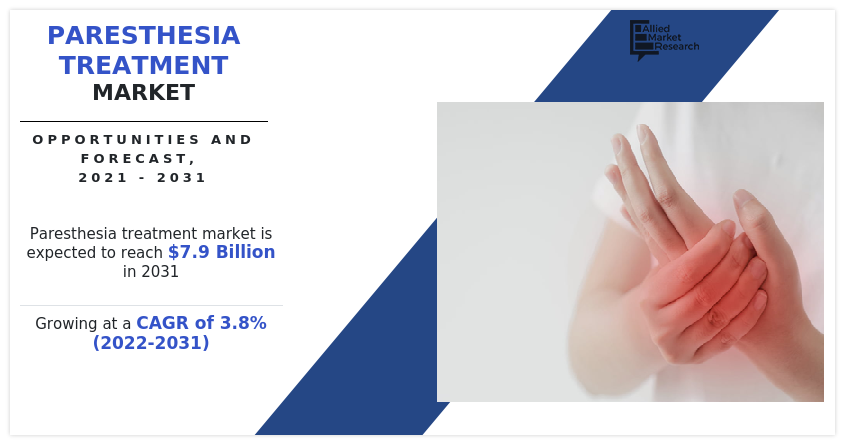
On the other hand, low effectiveness of medicines associated with the treatment, and stringent regulatory rules of the authority for the approvals of the medicines are expected to hinder the growth of the market. Conversely, the paresthesia treatment market opportunity include the factor like increase in investments in the research and developments (R&Ds) for better treatment.
The COVID-19 pandemic affected the paresthesia treatment industry in a fairly negative way, like various other pharmaceutical industries were effected. The pandemic has effected the paresthesia treatment market share either by directly impacting the production of the medicines. Moreover, the distribution channels were also impacted with the disruptions in the transport of the materials. In addition, the pharmaceutical companies were impacted by the financials crisis due to the slowdown of the sales of the products. The major crisis include supply of raw materials for manufacturing drug products due to disruptions in transportation facility. This made the gap between demand and supply to increase resulting in the bad impression of the market players. Since, the treatment therapy may result in the addiction of the medicines or may also make the patients to completely rely on the medicines for the treatment of temporary or chronic paresthesia.
Overall, the COVID-19 pandemic had a fairly negative impact on the paresthesia treatment industry owing to decreased production of the medicines and disturbances in supply of the medicines during the COVID-19 pandemic. However, this situation is expected to change post COVID-19 with the increase in R&D activities to study the treatment options available for paresthesia and regularities in the distribution & supply of the medicines.
Paresthesia Treatment Market Segmentation
The paresthesia treatment market is segmented into Disease Type, Treatment, Distribution Channel and Region. By disease type, the market is classified into acute paresthesia and chronic paresthesia. Furthermore, the acute paresthesia is sub-classified as pediatric and adult. Moreover, the chronic paresthesia is sub-classified as pediatric and adult. By treatment, the market is classified into immunosuppressant, anticonvulsants, topical creams, antivirals and others. By distribution channel, the market is classified into hospital pharmacy, retail pharmacy, and online pharmacy. Region wise, the market is studied across North America (U.S., Canada, and Mexico), Europe (Germany, France, the UK, Italy, Spain, and Rest of Europe), Asia-Pacific (China, Japan, Australia, India, South Korea, Taiwan and Rest of Asia-Pacific), and LAMEA (Brazil, Turkey, Venezuela, South Africa, Saudi Arabia, and Rest of LAMEA).
Market By Disease Type Segment Review
By disease type, the chronic paresthesia segment is anticipated to grow with the largest share during the forecast period. This is attributed to the increase in the prevalence of chronic paresthesia disease, and availability of number of targeted therapeutics. Recent advances in medicine technology have contributed to improve the understanding of treatment options, thus driving the need for targeted drug therapies for paresthesia treatment.
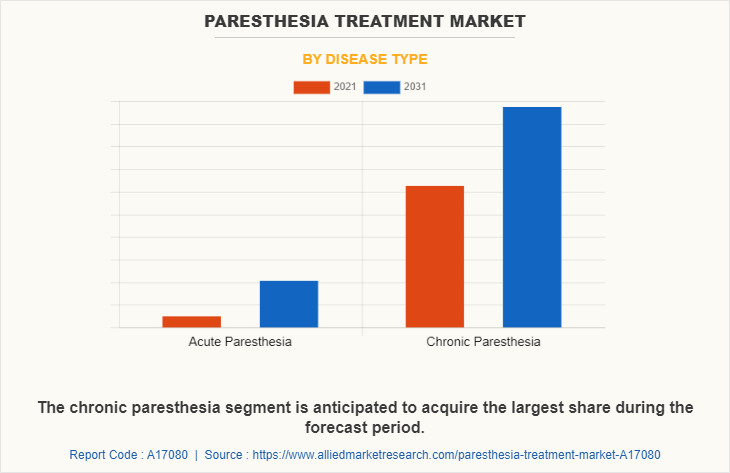
Market By Treatment Segment Review
By treatment, the topical creams segment was the major revenue contributor in 2021, and is anticipated to continue this trend during the forecast period due to increase in number of patients suffering from paresthesia. In addition, adoption of unhealthy lifestyle and rise in governmental initiatives contribute toward the growth of the market.
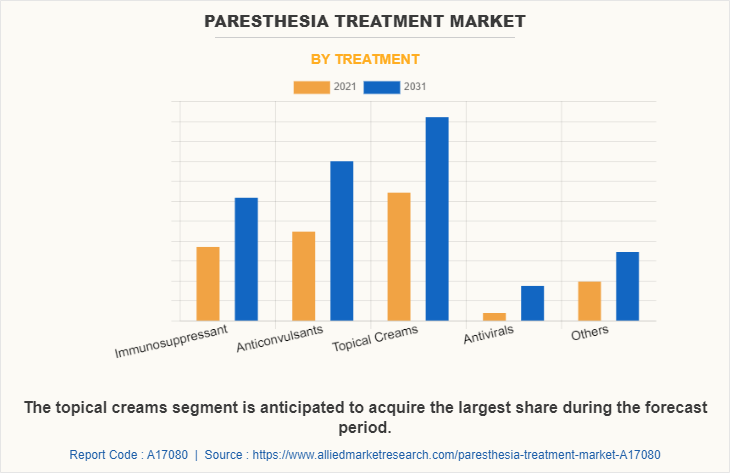
Market By Distribution Channel Segment Review
By distribution channel, the retail pharmacy segment was the major revenue contributor in 2021, and is anticipated to continue this trend during the forecast period due to increase in number of retail pharmacy shops globally and ease of availability of drugs at the retail shops.
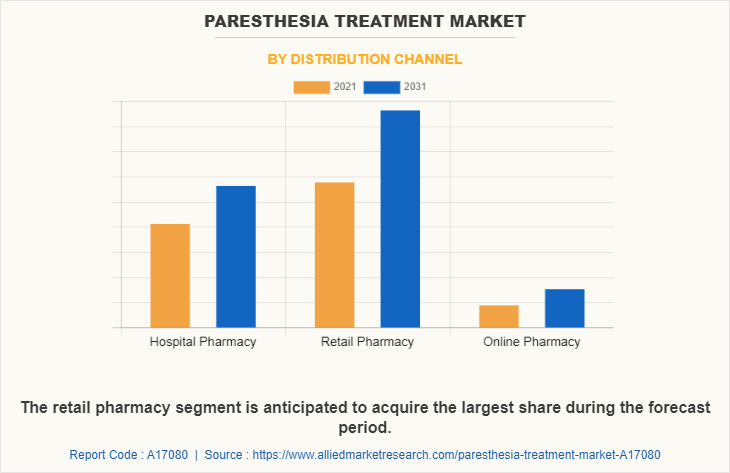
Market By Region Review
North America accounted for the largest share of revenue in 2021, and is anticipated to maintain its dominance from 2022 to 2031, owing to presence of large patient population, strong presence of key players, ease of drug availability, well developed healthcare infrastructure, favorable reimbursement policies in healthcare system, higher number of research, development & innovation activities and higher adoption of advanced therapeutics.
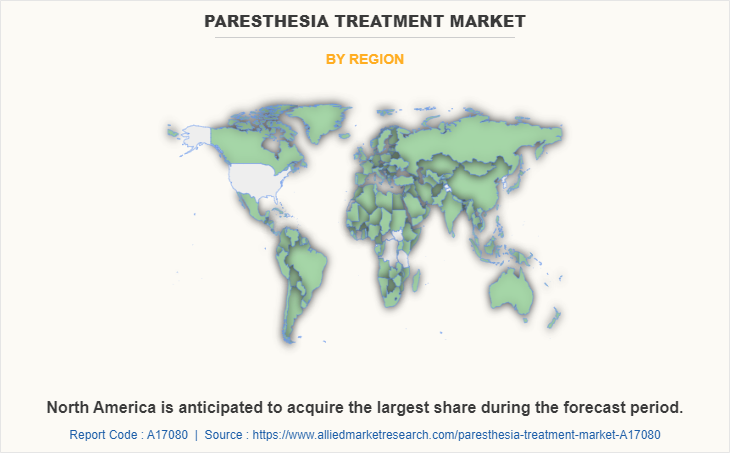
Key Benefits For Stakeholders
- This report provides a quantitative analysis of the market segments, current trends, estimations, and dynamics of the paresthesia treatment market analysis from 2021 to 2031 to identify the prevailing paresthesia treatment market opportunities.
- The market research is offered along with information related to key drivers, restraints, and opportunities.
- Porter's five forces analysis highlights the potency of buyers and suppliers to enable stakeholders make profit-oriented business decisions and strengthen their supplier-buyer network.
- In-depth analysis of the paresthesia treatment market segmentation assists to determine the prevailing market opportunities.
- Major countries in each region are mapped according to their revenue contribution to the global paresthesia treatment market size.
- Market player positioning facilitates benchmarking and provides a clear understanding of the present position of the market players.
- The report includes the analysis of the regional as well as global paresthesia treatment market trends, key players, market segments, application areas, and market growth strategies.
Paresthesia Treatment Market Report Highlights
| Aspects | Details |
| By Disease Type |
|
| By Treatment |
|
| By Distribution Channel |
|
| By Region |
|
| Key Market Players | Abbott Laboratories, GlaxoSmithKline plc., Cyberonics, Inc., Nevro Corp., Stimwave LLC, Pfizer, Merck, AbbVie Inc., Omron Healthcare, Inc., Baxter International Inc., Stryker Corp., Glenmark, Boston Scientific Corporation, EnteroMedics Inc., Cipla Ltd., Medtronic, Bio-Medical Research Ltd. |
Analyst Review
The utilization of paresthesia drugs is expected to witness a significant rise owing to increase in prevalence of chronic diseases such as cancer, in both developed and developing economies. Furthermore, the paresthesia treatment market growth is propelled by surge in geriatric population, increase in collaboration between pharmaceutical companies for development of novel drugs, and rise in awareness associated with paresthesia.
North America accounted for the highest market share in 2021, due to availability of advance treatment drugs, higher disease awareness, and heavy expenditure by the government on healthcare, followed by Europe and Asia-Pacific. Asia Pacific is expected to exhibit fastest market growth owing to increase in incidence of chronic diseases such as cancer. Pharmaceutical companies have focused on expanding their presence in emerging economies, which is anticipated to drive the market growth.
The total market value of Paresthesia Treatment market is $7,900.0 million in 2031.
The market value of Paresthesia Treatment market in 2021 is $5,376.28 million.
The rise in prevalence of disease such as cancer, surge in geriatric population, and lack of proper nutrients in the food are the key trends of Paresthesia Treatment Market report.
The chronic paresthesia segment is anticipated to grow with the largest share during the forecast period. This is attributed to the increase in the prevalence of chronic paresthesia disease, and availability of number of targeted therapeutics.
The base year is 2021 in Paresthesia Treatment market.
Yes, the Paresthesia Treatment market companies are profiled in the report.
Yes, the Paresthesia Treatment market report provides PORTER Analysis.
Asia-Pacific is expected to grow at the highest CAGR of 5.0%, owing to increase in number of affected population and rise in awareness related to different types of paresthesia.
Loading Table Of Content...



